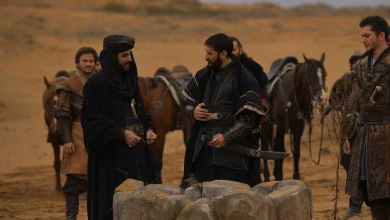Who was Kara Tegin: Salahuddin Ayyubi’s Trusted Commander
From rivalry to alliance: The story of Kara Tegin and his role in Salahuddin Ayyubi’s campaigns

The story of Kara Tegin, also known by his real name Saad ad-Din Masud ibn Onur, is one of transformation, loyalty, and the complex dynamics of medieval Islamic history. Known for his association with Salahuddin Ayyubi, Kara Tegin’s journey from rivalry to alliance is a tale that highlights the intricate power struggles of the 12th century. Here, we delve into the historical accounts of this fascinating figure, his background, and his pivotal role in Islamic history.
Kara Tegin’s Early Life and Background
Kara Tegin was born into the Boru clan of the Turks, a family of notable military and administrative figures. His father, Mu’in ad-Din Onur, served as the governor of Damascus under the Burid dynasty, a Turkish Sunni Muslim ruling house. Contrary to popular belief, historical evidence suggests that Kara Tegin was likely born into Islam, as his father was a practicing Muslim.
The early stages of Kara Tegin’s life remain largely undocumented, but his lineage and upbringing in a powerful family laid the foundation for his future roles in governance and military leadership.
Rivalry with Sultan Nuruddin Zengi
One of the defining elements of Kara Tegin’s life was his animosity toward Sultan Nuruddin Zengi. This rivalry can be traced back to 1154 CE, when Nuruddin seized Damascus, ending Mu’in ad-Din Onur’s rule. This event not only displaced Kara Tegin’s family but also planted the seeds of enmity between the two.
From Sultan Nuruddin’s perspective, the takeover was a strategic move to prevent Crusader dominance in the region. By unifying key territories under his rule, Nuruddin aimed to protect Jerusalem and other crucial areas from falling into enemy hands.
Alliance with Salahuddin Ayyubi
Despite his initial hostility toward Sultan Nuruddin, Kara Tegin eventually allied with Salahuddin Ayyubi, a relationship cemented through marriage ties. Kara Tegin’s sister, Asmat Khatun, married Sultan Nuruddin and later Salahuddin, while Kara Tegin himself married Salahuddin’s sister, Rabia Khatun. These familial bonds transformed their relationship from adversaries to trusted allies.
Kara Tegin’s military expertise played a crucial role in several key campaigns, including the historic conquest of Jerusalem in 1187 CE. He also defended Damascus from Crusader invasions, showcasing his loyalty and strategic acumen.
Kara Tegin’s Legacy
Saad ad-Din Masud ibn Onur, or Kara Tegin, is remembered as a warrior and administrator whose contributions significantly influenced Islamic history. From his early rivalry with Sultan Nuruddin to becoming one of Salahuddin Ayyubi’s most trusted commanders, his journey reflects the complexities of medieval power dynamics.
Though historical records about his death are scarce, his legacy endures as a figure who played a pivotal role in unifying Muslim territories against external threats. His transition from opposition to unwavering loyalty remains a testament to the fluid nature of alliances during that era.
Conclusion
Kara Tegin’s life offers a unique glimpse into the intertwined relationships and strategic decisions of the 12th century. His role as a key ally of Salahuddin Ayyubi, particularly in the defense of Damascus and the conquest of Jerusalem, solidifies his place in history. Through his actions, Kara Tegin exemplified the resilience and adaptability necessary to navigate the challenges of his time.
For those interested in learning more about the unsung heroes of history, Kara Tegin’s story is a compelling reminder of the intricate narratives that shape our past.
FAQs About Kara Tegin and His Role in History
1. Who was Kara Tegin?
Kara Tegin, also known as Saad ad-Din Masud ibn Onur, was a 12th-century Turkish commander and administrator. He is remembered for his alliance with Salahuddin Ayyubi and his role in key battles of the Crusades era.
2. What was Kara Tegin’s real name?
His real name was Saad ad-Din Masud ibn Onur, and he was a member of the Boru clan of the Turks.
3. Was Kara Tegin born a Muslim?
Historical evidence suggests that Kara Tegin was likely born into Islam, as his father, Mu’in ad-Din Onur, was a Sunni Muslim governor of Damascus.
4. Why did Kara Tegin have animosity toward Sultan Nuruddin Zengi?
The rivalry stemmed from Sultan Nuruddin Zengi’s seizure of Damascus in 1154 CE, which ended the rule of Kara Tegin’s father, Mu’in ad-Din Onur.
5. How did Kara Tegin become an ally of Salahuddin Ayyubi?
Kara Tegin formed an alliance with Salahuddin Ayyubi through marriage ties. His sister, Asmat Khatun, married both Sultan Nuruddin Zengi and Salahuddin, while Kara Tegin married Salahuddin’s sister, Rabia Khatun.
6. What role did Kara Tegin play in Salahuddin Ayyubi’s campaigns?
Kara Tegin served as one of Salahuddin Ayyubi’s trusted commanders, contributing to major battles, including the conquest of Jerusalem in 1187 CE and the defense of Damascus against Crusader invasions.
7. Did Kara Tegin convert to Islam later in life?
No, historical evidence indicates that Kara Tegin was born into Islam, contrary to some popular beliefs.
8. What is Kara Tegin’s historical significance?
Kara Tegin is significant for his military and administrative contributions, his alliance with Salahuddin Ayyubi, and his role in shaping the political and military landscape of the Crusades era.
9. Are there detailed accounts of Kara Tegin’s early life?
No, detailed records of his early life are scarce, but his familial background and connections suggest a strong military and administrative lineage.
10. How did Kara Tegin’s life end?
There are no precise records of Kara Tegin’s death, but it is believed that he passed away shortly after the death of his sister, Asmat Khatun. His legacy as a military leader and ally of Salahuddin remains well-recognized in history.





